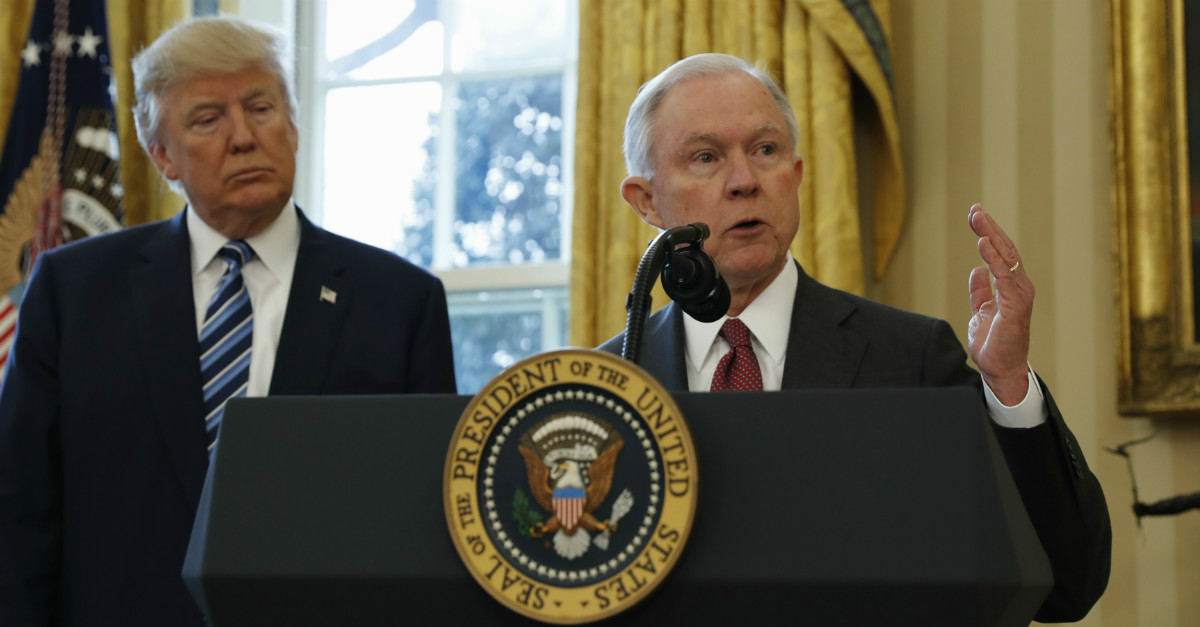On Friday, news broke that Donald Trump’s 2018 budget would reportedly cut the budget of the Office of National Drug Control Policy by almost 95 percent. According to CNN, who got the draft themselves, this means the ONDCP would fall “from a $380 million budget to $24 million.”
Videos by Rare
Libertarians and other anti-prohibitionists should be careful not to celebrate too early. The drug war, like life, tends to find a way. The draft memo justifies these cuts mostly in terms of redundancy. And we will still have a DEA, Chris Christie’s shiny new anti-opioid task force, and myriad federal, state, and local drug laws. Drug warriors may be having a bad day, but they shouldn’t panic too much.
RELATED: The United States should legalize weed to break its opioid addiction
Many Democrats and Republicans appear to be horrified by this news. Acting drug czar Rich Baum mourned the potential loss of some 33 government employees. Democrats mostly assumed this meant that Trump hates people with painkillers problems and wants them to OD.
Bizarrely, this is being framed by a lot of people as another promise broken by the president. The New York Times begins its report by describing how Trump sounded like a Nixonian law and order hard-ass, ready to be “ruthless” (as he said later in office), and ready to fight opioids with more government. And, well now look at this news. This is a 180. But it’s good news.
Do the people suddenly want a war on drugs again? Is government—any government—so sacred to Democrats and “doing something” about a social ill so sacred to Republicans that this brutal cut is anything except a celebration?
We were only just beginning to dial it back down. More than half the population of the US believes in recreational marijuana. Nearly everyone accepts that medical marijuana has its merits. Even ardent drug warriors like Attorney General Jeff Sessions appear to have accepted that it would be politically unwise to use federal agents to interfere with state laws.
However, the mere appointment of Sessions and the dour law and order talk of Trump suggests that reform efforts have diminished. No matter if more than 100 million Americans have tried marijuana, and that the official drug war is a trillion dollar failure, if a few cops are tragically murdered, somehow nothing in American law enforcement needs to change.
Last month, it appeared that Rep. Tom Marino would become the new head of the ONDCP. The briefly-cabinet-level position was given the unwholesome, unofficial name of “drug czar” by one Senator Joe Biden in 1982. The office itself is a product of the drug war at its most frantic pitch. The FBI, the DEA, state, and local law enforcement somehow wasn’t sufficient. America also needed an executive level department that spent three decades funding clunky domestic propaganda against drugs. The end result was ineffectual, expensive condescension — either in the form of antidrug ads like the Above the Influence Campaign or actually within “very special” television shows. Tom Angell, the founder of the Marijuana Majority, wrote via email that even if you believe government has a part to play in combatting drug abuse, “historically ONDCP has been ideologically driven and done a very bad job at fulfilling its mandate.” Plus, only in recent years have they turned their focus away from obsessing over marijuana to more dangerous substances such as meth.
But since the militarized days of the Reagan, Bush, Clinton, and Bush again years, lame duck Obama led America into a gentler drug war. One where we don’t say drug war, and we help “people, whether they like it or not.” Marino, who has a nasty voting record on criminal justice, withdrew his name for drug czar. It’s a good thing that he did, considering that his great brainchild during a 2015 Congressional hearing on heroin was the idea of “hospital-slash-prisons.”
Coercion, then, is still the name of the game, even if it is tied up with a public health bow. And, again, though things have changed on marijuana, people have become more frightened by the increases in opioid overdoses. This is a grave concern, but it’s not one that should make us forget the less century of government’s failure to control drug use and abuse—and in fact, it’s truly impressive ability to make everything about narcotics worse.
RELATED: Jordan Edwards’ tragic killing reminds us so much still needs to change about policing in America
It’s embarrassing, then, to watch people sniffle, such as the Democratic National Committee spokesperson who called this “a cruel betrayal” and “a lie.” Trump said a lot of dramatic stuff about drug use on the campaign trail. Thirty years ago, he also suggested that America legalize all drugs in order to take the power away from dealers. One of those Trumps is better. We’re not likely to get him back, and the president is a disaster on countless issues of importance to peace-loving, small government people.
On the other hand, if he really manages to fatally hurt an executive level drug war office, and reduce government redundancy in the process, that should be considered a win for everyone except that dwindling number of people whose livelihoods depend on perpetuating the disaster that is the war on drugs.



